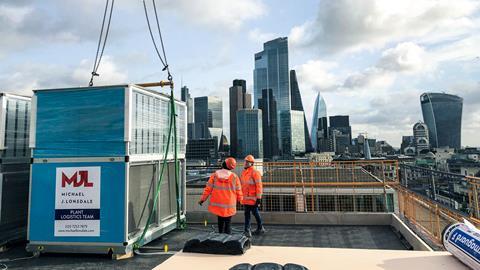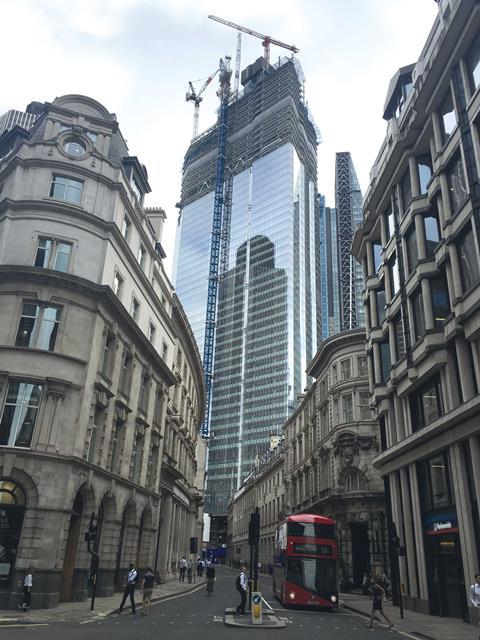Yesterday’s collapse of Michael J Lonsdale has prompted more anger and sadness in a sector already used to such events. Dave Rogers reports
“I think there’s going to be a lot of contractors in crisis meetings this morning, working out what to do next.”
The collapse into administration yesterday of Michael J Lonsdale has caused widespread shock and anguish among senior industry figures contacted by Building.
“The construction industry is broken when the likes of MJL disappear,” one senior source said. “Lots of damage is to come.”
Michael J Lonsdale was set up in the mid-1980s and specialised in the London M&E market. In its last set of accounts for the year to September 2022, the Berkshire-based firm posted improved income of £191m and pre-tax profit of £2.5m, down from £2.6m the year before. Staff numbers were just under 250 but were thought to be above 300 at the time of its implosion.

Its roll call of recent jobs included the towers at 22 Bishopsgate and nearby 8 Bishopsgate as well as the Peninsula hotel at Hyde Park Corner. “They did loads of stuff,” one consultant said. “It’s a sad day.”
Building understands that among the current jobs the firm was lined up to work on were Mace’s Woolgate Exchange scheme, while it was close to a deal on Overbury’s refurbishment of the Citibank tower in Canary Wharf. The St Pancras Commercial Centre, being built by Bam, is another job thought to have been affected.
Lonsdale was run by founder and chairman Michael Hoodless and his managing director Gary Herbert, who joined the business in 1988 a couple of years after it was set up.
A lot of contractors panicked after covid and bought work and now they’re having to deal with the shock of inflation. They’re trying to get the subcontractors on the hook
“There’s a lot of goodwill to those guys,” one source said. “They’re both larger than life characters. They’re good blokes. I’m not sure what’s been going on behind the scenes but their statement yesterday was pretty clear.”
In a memo signed by the stricken firm’s directors, announcing to staff its administration, the company spelt out who it thought in part should carry the can for its woes.
It said “aggressive commercial tactics employed by certain general contractors has regrettably led us to this unfortunate situation”.
“I’d heard some firms weren’t paying them but there were others who were making faster payments to help them out,” one source said.
“A lot of contractors panicked after covid and bought work and now they’re having to deal with the shock of inflation. They’re doing jobs at the wrong price and they’re trying to get the subcontractors on the hook. I think there will be more of this.”
Another added: “It’s very sad as Gary Herbert and his team have built a great business but sadly some contractors are throwing everyone under the bus to make sure they don’t have to take any responsibility.”
Lonsdale’s statement said it had got through the shocks of Brexit and covid-19 but added: “Unfortunately, the ongoing conflict in Ukraine has added further strain, with surging inflation, workforce shortages, project delays, and supply chain disruptions, ultimately culminating in financial difficulties for the business. Our credit rating has suffered due to our limited credit with many suppliers, necessitating the need to make pro-forma payments for goods – a practice that is unsustainable for a business of our scale, with an annual turnover of £250m.”
When a company of this size goes, they usually owe a lot of money. The bigger problem for us is the people in their supply chain
One rival said that with M&E being a trade at the tail end of contracts, getting the pricing right on jobs is all the more problematic. “They were a good company but they probably pushed too hard on programme, price and risk taking and their generally elongated contract periods have probably caused real inflation pain that they couldn’t back off to others.”

This year seems to have been especially bad for firms going under. Tolent, Buckingham, Henry Construction, Ilke Homes, J Tomlinson to name a few have all gone.
“Firms are going bust all the time at the moment,” one boss said. “It’s a real issue. I think it’s a combination of covid, inflation and now there’s less work around.”
He added: “My biggest concern is how many people are in Lonsdale’s supply chain and to what extent this is going to affect them. When a company of this size goes, they usually owe a lot of money. The bigger problem for us is the people in their supply chain.”
He dismissed talk of a resurrection for Lonsdale. “In my opinion, they’re gone. Their staff are going to go elsewhere.”
Recruitment consultants are already seeing a flood of CVs from Lonsdale staff while main contractors will also be on the lookout. “They’ll want their jobs to carry on, so they’ll be picking up staff,” one source said.
Access to credit has been a growing issue since supply lines were tightened. “It’s quite hard to get debt and one way to save money and keep cash is not to pay bills,” one source said. “It’s as simple as that.”
He added: “The initial concern to the surviving masses will be the potential further moves taken by the bonds and credit insurance markets in tightening the availability of such securities - which are relied upon by funders and developers at the top and the supply chain at levels further down. A vicious circle [is] starting to form.”
So what are the lessons, then? “Some firms take money out in the good times and don’t leave enough in for the bad times,” one chief executive said. “I don’t know if that’s the case here but you have to keep cash in the business.”
And another source admitted: “One firm’s loss are others’ gains. Other tier two MEP firms will see an opportunity here. There are firms out there with incredibly strong balance sheets and there will be a flight to quality.”
For now, though, there is a lament that another well-established business has succumbed. “They were a good firm and they did some very good work,” one chief executive said. “Our team will miss them. We liked them and trusted them and when firms like that go, it’s very sad.”


























No comments yet